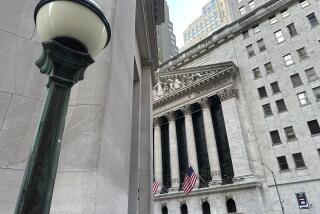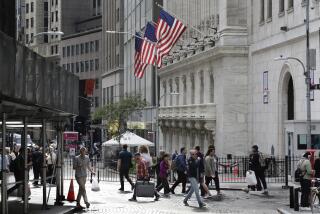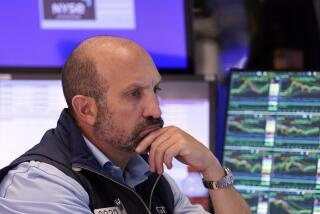Stocks Tumble as Yields Rise on Rate Fears
- Share via
Stocks closed a losing week with another setback Friday, and the yield on the long-term Treasury bond climbed to 7%, as Wall Street grew more jittery over the prospect of still-higher interest rates arriving with the summer.
But others said that in the stock market, at least, the interest-rate concerns are largely background noise and prices are simply taking an expected breather after their sharp run-up last month.
The Dow Jones average of 30 industrials fell 50.23 points to 5,643.18, giving the blue-chip gauge a loss for the holiday-shortened week of 119.68 points.
Broader measures of the market were mixed, as six stocks fell for every five that rose on the New York Stock Exchange. Big Board trading volume was a moderate 351.8 million shares, down from 382 million Thursday.
The tone for the market’s weakness was set before lunchtime, when bond prices began tumbling in response to continued market speculation that the Federal Reserve Board might raise short-term interest rates in the coming weeks.
Traders are skittish that if the U.S. economy continues to expand briskly, the central bank will lift rates in an effort to head off higher inflation. Rising rates typically dampen demand for stocks because they lift corporate borrowing costs, reduce profits and make fixed-income investments more attractive relative to stocks.
But as usual there was no consensus about how the Fed will act; some analysts even believe the Fed will wind up trimming rates this summer.
The bellwether 30-year Treasury bond yield--which moves inversely to its price--traded above 7% for much of the day before closing at 6.99%, up from 6.93% late Thursday.
But other analysts asserted that the dynamics of the stock market itself, rather than economic forecasts, are playing a bigger role in determining prices.
“Obviously there’s concern about how high interest rates might go,” said Alfred E. Goldman, market strategist at A.G. Edwards & Sons in St. Louis. “But nobody knows how high rates are going, or at what level they would kill the bull market” in stocks, he said.
“The reality is that the Dow was up 375 points in just the three weeks leading up to this week, and we were due to pause to refresh,” he said.
Indeed, despite its poor week, the Dow Jones industrial average is still up 526.06 points for the year to date, or 10.3%. The Nasdaq composite index--which is dominated by technology and small-capitalization stocks--is doing even better, having climbed 18% this year, including a 9.95-point gain Friday to 1,243.43.
“The visible excuse” for the general market’s pullback this week “will be the action in interest rates, particularly with the long bond touching 7% today,” said Greg Nie, technical analyst at Everen Securities in Chicago. “But this was a natural swing back” from the market’s recent rally, he said.
Nie also cautioned against reading too much into the market’s behavior this week because trading volume was relatively modest. In all four sessions, Big Board volume was well below its average so far this year of 420 million shares, he said.
To be sure, many analysts have concerns about whether the market is showing signs that prices have risen too much lately relative to the underlying companies’ prospects--and therefore is poised for a nasty downfall.
For instance, many small-company stocks are displaying exceptional volatility, which is “a cause for concern,” said Russ Labrasca, senior vice president of Sutro & Co. in San Francisco. “We’re seeing companies with short track records with broad swings in their prices, and that could be setting the stage for a correction,” or sharp decline, he said.
* On Nasdaq, Intel led the active list and jumped 4 to 75 1/2, while Iomega fell 1 1/2 to 44 1/8 and Sun Microsystems rose 2 1/8 to 62 5/8.
* Oil stocks helped lead the Dow Jones industrials lower, including Exxon, down 1 7/8 to 84 3/4, and Texaco, off 1 1/4 at 83 3/4. Prices of crude-oil futures settled lower Friday amid continued speculation about Iraq’s reentry into the oil market.
Meanwhile, the dollar fell against most other major currencies in foreign exchange trading. The greenback dropped to 1.5233 German marks in late New York trading, down from 1.5344 Thursday, but it rose to 108.05 Japanese yen from 107.65 yen.
Market Roundup, D3
(BEGIN TEXT OF INFOBOX / INFOGRAPHIC)
A Nervous Market
Stock prices lost ground in three of four sessions this week amid growing fears of higher lending costs, paring the market’s sizable gain so far this year. Standard & Poor’s 500 stock index, weekly closes since Jan. 1:
Friday: 669.12
Source: TradeLine
Selected Interest Rates
Averages of daily rates ended Thursday, in percent
Corporate AAA bonds: 7.55%
90-day CDs: 5.34%
3-month Treasury bills: 5.04%
Bank prime rate: 8.25%
Municipal bonds: 5.87%
Federal funds rate: 5.19%
Discount rate: 5.00%
Source: Federal Reserve Board
More to Read
Inside the business of entertainment
The Wide Shot brings you news, analysis and insights on everything from streaming wars to production — and what it all means for the future.
You may occasionally receive promotional content from the Los Angeles Times.











